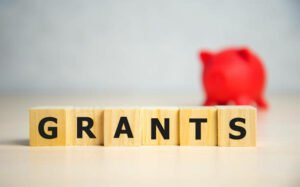Your Guide on How to Hire a Grant Writer in 2024

Are you looking to secure crucial funding for your organization? Wondering how to hire a grant writer? Start here with expert tips and insights on finding the perfect match for your grant writing needs.
Hiring a grant writer can make all the difference in securing much-needed financial support for nonprofit organizations and businesses seeking funding. Grant writers are skilled professionals who specialize in crafting compelling proposals that effectively communicate an organization’s mission and needs to potential funders. Finding the right grant writer for your organization can be daunting, but with the right approach and knowledge, you can successfully hire a grant writer who can help you secure the resources you need to thrive.

Understanding the Role of a Grant Writer
For organizations seeking funding, hiring a skilled grant writer is a crucial step toward securing grants and achieving their goals. Grant writers play a pivotal role in the nonprofit sector by researching funding opportunities, crafting compelling proposals, and building relationships with donors.
Key Responsibilities and Duties
Understanding a grant writer’s key responsibilities and duties is essential for organizations looking to hire the right candidate. Grant writers are tasked with researching grant opportunities that align with the organization’s mission, writing persuasive grant proposals, and submitting timely and accurate documentation to funders. They are also responsible for maintaining grant calendars, tracking deadlines, and reporting on the impact of funded projects.
Necessary Skills and Qualifications
On top of possessing excellent writing skills, grant writers should have a strong understanding of nonprofit management, fundraising principles, and grant writing best practices. They must be detail-oriented, organized, and able to work effectively under pressure to meet tight deadlines. Moreover, grant writers should be adept at conducting thorough research, analyzing data, and communicating complex ideas clearly and concisely.
This chapter provides a comprehensive overview of the key responsibilities, duties, necessary skills, and qualifications required for a successful grant writer. Understanding these aspects is essential for organizations looking to hire a competent professional who can secure funding and support their mission effectively.
Preparing to Hire a Grant Writer
Defining Your Needs and Goals
Some of the key steps in preparing to hire a grant writer involve defining your organization’s needs and goals for seeking grants. Consider what specific projects or programs require funding, your overall fundraising goals, and what type of grants you want to secure. Clearly outlining your objectives will help you determine the skills and experience you need as a grant writer.
It’s also important to assess your organization’s capacity to manage grants, including grant compliance and reporting requirements. Understanding your limitations and strengths will guide you in finding a grant writer who can support your organization effectively in achieving its funding goals.
Budgeting for a Grant Writer
Preparing a budget for hiring a grant writer is a crucial aspect of the process. When budgeting for a grant writer, consider the scope of work, the required experience, and the complexity of the grants you are pursuing. Research market rates for grant writers in your region to set a realistic budget that aligns with your organization’s financial resources.
Hiring a grant writer is an investment in your organization’s success in securing funding. While costs may vary depending on the writer’s expertise and the nature of the grants you are pursuing, be prepared to allocate a reasonable budget to hire a skilled professional to help you achieve your funding goals.
Finding Qualified Candidates
Despite the growing demand for grant writers, finding qualified candidates can be challenging. To ensure you hire a grant writer who can effectively secure funding for your organization, it is important to know where to look for them and how to utilize professional networks and associations.
Where to Look for Grant Writers
Where you look for grant writers can greatly impact the quality of candidates you attract. Some common places to find grant writers include job boards, freelance websites, and social media platforms. It is important to post detailed job descriptions outlining the specific skills and experience you seek in a grant writer to attract the right candidates. Networking with other organizations in your sector can also help you find referrals for experienced grant writers.
Utilizing Professional Networks and Associations
Professional networks and associations are excellent resources for finding qualified grant writers. Organizations such as the American Grant Writers Association, Grant Professionals Association, and LinkedIn groups dedicated to grant writing are all great places to connect with experienced professionals in the field. By tapping into these networks, you can access a pool of skilled grant writers knowledgeable about the latest trends and best practices in grant writing.
Writers active members of these professional networks and associations will likely be more motivated and committed to their craft. They may also have access to exclusive job postings and professional development opportunities that can further enhance their skills as grant writers. Utilizing these networks and associations can help you find a grant writer who is qualified and passionate about securing funding for your organization.
Where to Discover Top Nonprofit Grant Writers
In your quest for the best nonprofit grant writers, several platforms offer comprehensive listings of skilled professionals worldwide. These resources present detailed profiles showcasing expertise, certifications, experience, ratings, and hourly rates, empowering you to find the ideal match for your organization’s needs while staying within your budget.
Here are some invaluable websites for finding top-notch nonprofit grant writers:
1. Grant Writer Team: This platform connects grant seekers with proficient and accomplished grant writers. While you won’t find an immediate list of available writers, you can submit a form detailing your requirements, which will be circulated among their pool of writers. Additionally, they offer a range of other grant-related services on their website.
2. Upwork: Renowned for sourcing freelance talent, Upwork provides access to a vast array of grant writers, with hourly rates spanning from $11 to $150. You can browse through profiles, review ratings, and select the perfect fit for your project.
3. Fiverr: Like Upwork, Fiverr hosts thousands of grant researchers and writers. On this platform, you can peruse client reviews, explore service offerings, and assess hourly rates, typically ranging from $10 to $200. Your selection of pay and resources depends on the package you choose.
4. LinkedIn: Leveraging its reputation as a premier networking platform for professionals, recruiters, and job seekers, LinkedIn offers many opportunities to connect with grant writers globally. Post a job, engage in discussions, negotiate pay, and explore potential candidates with ease and efficiency.
5. Indeed: With over 30 million companies worldwide utilizing its services, Indeed is a powerful tool for finding the right talent. While you may need a subscription plan to access unlimited resumes and contact candidates, it provides a vast pool of potential grant writers to explore.
The Selection Process
When hiring a grant writer, the selection process is crucial for finding the right candidate to help your organization secure funding. It involves reviewing portfolios and writing samples, conducting interviews, and checking references to ensure you hire the best fit for your grant writing needs.
Reviewing Portfolios and Writing Samples
Review the portfolios and writing samples of potential grant writers to begin the selection process. Look for demonstrated experience in writing successful grant proposals and a track record of securing funding for organizations similar to yours. Pay attention to the quality of writing, attention to detail, and the ability to communicate a compelling case for support.
Any inconsistencies or red flags in the portfolio or writing samples should raise concerns. Verify the work’s authenticity and assess whether the writing style aligns with your organization’s voice and values. Choosing a grant writer who can effectively tell your organization’s story and mission to potential funders is essential.
Conducting Interviews and Checking References
Conduct interviews With the shortlisted candidates to better understand their experience, approach to grant writing, and overall fit with your organization. Ask about their success rate with grant applications, how they conduct research for proposals, and how they handle tight deadlines and multiple projects simultaneously.
During the interviews, inquire about specific examples of successful grant applications they have written and seek references from past clients or employers to validate their claims. Contacting references allows you to gather insights into the candidate’s work ethic, communication skills, and ability to work collaboratively with a team. It’s essential to ensure that the grant writer you hire is skilled in writing proposals and aligns with your organization’s values and goals.
Evaluating Proposals and Bids
Your search for a grant writer has led to the submission of various proposals and bids. Now comes the crucial stage of evaluating and selecting the right candidate for your organization. This process requires careful consideration to ensure you make an informed decision that aligns with your goals and budget.
Understanding Pricing Structures
Bids can vary greatly in terms of pricing structures. Some grant writers charge a flat fee for their services, while others may work hourly. It’s essential to understand how the pricing is structured in each bid to determine which option best fits your budget and project needs. Remember that the lowest bid may not always translate to the best value, as quality and experience should also be considered.
Assessing Proposal Quality and Fit
Structures can evaluate the quality and fit of each proposal by assessing the clarity of the writing, the relevance of the experience, and the alignment with your organization’s mission and goals. Look for proposals demonstrating a clear understanding of your project and showcase the writer’s ability to meet your needs. Consider asking for samples of past work or references to further gauge the quality of the proposal.
As part of the evaluation process for assessing proposal quality and fit, consider conducting interviews with the most promising candidates. This will allow you to ask specific questions, discuss your project in more detail, and assess how well the grant writer communicates and engages with you. Remember, the goal is to find a grant writer who has the skills and experience, shares your passion for your cause, and can effectively convey that in their writing.
Legal Considerations and Contracts
Unlike other hiring forms for your organization, bringing on a grant writer involves unique legal considerations and the necessity for a well-drafted contract. As grant writing involves handling sensitive financial information and the potential for conflicts of interest, it is imperative to protect your organization and the grant writer with a solid legal agreement.
Drafting a Work Agreement
Legal due diligence is crucial when drafting a work agreement with a grant writer. The contract should clearly outline the scope of work, deadlines, payment terms, and any confidentiality agreements. It should also specify the intellectual property rights of the work produced during the engagement. Consulting with a legal professional to draft or review the agreement can ensure that both parties are protected and clear on their obligations.
Setting Clear Terms and Conditions
An important aspect of the contract is setting clear terms and conditions regarding the grant writer’s responsibilities, deliverables, and communication channels. This includes specifying the number of revisions included in the fee, the process for requesting additional work, and how disputes will be resolved. Clearly defining these terms can prevent misunderstandings and ensure a smooth working relationship.
Any contract with a grant writer should also address the termination of the agreement, including the return of confidential information and the final payment. This ensures that both parties are aware of the consequences should the engagement need to be ended prematurely.

Working with Your Grant Writer
Communication Best Practices
Best practices for communication with your grant writer include establishing regular check-in meetings, clearly outlining expectations and deadlines, and maintaining open lines of communication throughout the project. It is essential to provide your grant writer with all necessary information, including background materials, project goals, and any specific requirements for the grant application. Transparency and clarity in communication will facilitate a smoother collaboration and ensure that the grant proposal aligns with your organization’s vision and priorities.
Additionally, setting realistic timelines for feedback and revisions is crucial to the success of the grant writing process. Be responsive to any queries or requests for additional information from your grant writer to avoid delays in the project timeline. Effective communication fosters a productive working relationship and increases the likelihood of securing the desired funding for your organization.
Setting up a Project Timeline and Milestones
Communication is key when setting up a project timeline and milestones with your grant writer. Clearly define the scope of work, including the tasks to be completed, deadlines for each deliverable, and the overall timeline for the project. This will help you and your grant writer stay on track and ensure the project progresses smoothly toward completion.
For instance, you could create a detailed project schedule with milestones for each stage of the grant writing process, such as research, drafting, editing, and submission. Assign responsibilities and deadlines for each milestone to ensure accountability and maintain momentum. Regularly review and adjust the project timeline as needed to accommodate any unforeseen challenges or changes in direction.
Monitoring Work and Providing Feedback
Establishing Performance Metrics
To ensure the grant writer is meeting expectations, it is essential to establish clear performance metrics from the beginning. These metrics should be specific, measurable, achievable, relevant, and time-bound (SMART). By outlining these metrics, you and the grant writer can clearly understand what success looks like and track progress effectively.
Metrics to consider include the number of grant proposals submitted, success rates in securing funding, adherence to deadlines, and the quality of written proposals. Regularly reviewing and discussing these metrics with the grant writer can help keep them accountable and motivated to perform at their best.
The Feedback Loop and Making Adjustments
Monitoring the grant writer’s work involves more than just tracking numbers; it also requires providing timely and constructive feedback. The feedback loop should be a continuous process where you offer praise for achievements and guidance for areas needing improvement. This open communication is crucial for fostering a healthy working relationship and ensuring the grant writer continues to grow and develop in their role.
To make the feedback loop effective, be specific in your feedback, focus on behaviors that can be changed, and provide opportunities for the grant writer to ask questions or seek clarification. Making adjustments based on the feedback received can lead to improved performance and, ultimately, better grant proposals.
Final Words on How to Hire a Grant Writer
Now that you know how to hire a grant writer, you can confidently move forward in your search. Remember to establish a clear budget, thoroughly review the grant writer’s experience and track record, and communicate your organization’s goals and expectations. Following these steps, you can find a grant writer who will help you secure funding for your projects and initiatives. Good luck!
RELATED
Pro Bono Grant Writers for Nonprofits | Expert Assistance at No Cost in 2024
Comprehensive Guide on Grant Accounting Journal Entries in 2024
Your Guide to GI Bill Scholarships and Grants 2024
Home Grants for Seniors 2024 – Empowering Seniors.




